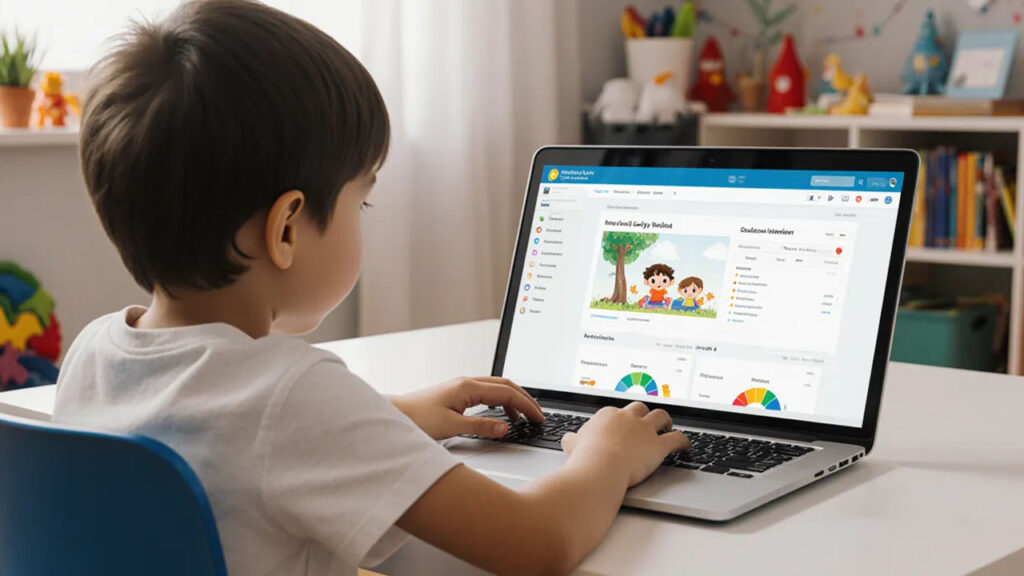
If your child is always glued to the screen, you can turn this time into something valuable—learning to code. Today’s digital world has parents worried about their children spending hours on devices.
Table of Contents
The good news is that not all screen time is equal. Guiding your kids to use screen time wisely leads them to sharpen their critical thinking and gain new skills. Let’s explore how you can do it in this guide.
The Modern Screen Time Challenge
Excessive screen time can be hard to deal with as a parent. Children aged eight to 12 years can spend four to six hours daily on their devices, while teenagers can spend up to nine hours. Out of these average times, only a little may be spent on learning activities.
While this may concern you, remember that screens can also be powerful when used wisely. Turn your child’s interests in apps and games into a learning process that will sharpen their problem-solving skills and logical reasoning with a coding camp for kids.
How to Turn Screen Time Into Learning
The secret to a productive coding session is balancing fun and learning. Encourage your kids to engage in coding projects to make them active creators instead of passively scrolling through the screen for hours.
Practical Strategies for Parents
- Set clear boundaries: Too much screen time can limit physical activity and affect kids’ mental health. To balance this, introduce screen-free times, such as walking or playing a tabletop game.
- Choose age-appropriate courses: Pick coding courses that suit your child’s level. Beginners can learn Scratch and level up to advanced courses as they gain more skills. The course and instructor should also be able to provide immediate feedback for the child’s improvement.
- Encourage hands-on projects: Help your child begin their coding journey with coding apps and coding tools with a drag-and-drop interface. Here, they can create their own games and puzzles.
- Monitor progress: Every child’s attention span is different. Let them work on their projects steadily and celebrate their small successes.
- Integrate coding: Insert coding sessions gradually in between their lesson plan so they won’t get overwhelmed right away.
Setting limits and supervising screen use can educate your kids about coding while keeping an eye out for their well-being.
Making Coding Concepts Stick
Younger children can start with visual programming languages with drop-code blocks and a block-based interface. It helps them learn to:
- Come up with interactive stories.
- Build a simple animation with rich lore and characters.
- Solve puzzles by testing drag-and-drop actions.
These activities keep children engaged while understanding abstract ideas more easily.
Group Projects and Collaboration
Learning coding doesn’t need to be done solo. Let your child take on team projects and coding challenges to:
- Solve problems together with other kids.
- Boost their creativity as they share their ideas.
- Be confident with their communication and social skills.
Group projects can teach your kids to be resilient, responsible, persistent, and considerate with others in every task they work on.
Why Coding Is More Than Play
Coding is no longer optional—it’s one of the most essential foundations of computer science. Here’s why coding skills matter:
- Drives the future job market: Technology is making our world increasingly interconnected. Coding knowledge can ensure a path for your kids to pursue as a profession when they grow up.
- Improved academic performance: Children who learn coding can improve their math results as they spot patterns in their code, like in algebra. It also enhances their reading comprehension as they read code and follow instructions.
- Better problem-solving skills: Coding can help develop problem-solving abilities and critical thinking skills as they examine and solve what’s wrong with their code.
- Early exposure: When young learners are introduced to coding projects early, they are more likely to pursue career opportunities in tech later on.
Teaching coding at a young age equips kids with strong innovation and pattern recognition skills. Online classes like those from Software Academy teach kids to write code and all the essential programming concepts they should know as they dive into computer programming.
Creative Coding Projects Kids Can Make
Introducing coding lets kids learn more about technology. They can make these fun projects to turn their imagination into reality:
- Writing code to control a simple robot.
- Games can be created in Scratch, Minecraft, or Roblox, each with its own interactive stories.
- Programming a virtual pet using loops and code blocks.
Teaching children to work on these projects enables them to apply their skills and see the fruit of their hard work. As a parent, you’re responsible for guiding your child as they take on the project they want to do.
Final Thoughts
You may see screen time as a distraction for your child, but you can turn it around by exposing them to coding education at an early age. Learning to code develops their critical thinking and problem-solving skills. Appropriate tools, coding apps, and fun coding projects let kids explore computer science at their own pace.
With every lesson, your child learns how technology works while making screen time a productive learning experience.